
Thanks to the new wire and die-sinking EDM machines from Mitsubishi, trainees in Villingen-Schwenningen receive the best-possible training.
In the corner of Germany bordering France and Switzerland is the peaceful town of Villingen-Schwenningen – in the heart of an important economic region. Within easy reach of the automotive centres of Stuttgart, Munich and Ingolstadt, component suppliers are domiciled here along with makers of electrical equipment, measuring instruments and clocks. Progressive training is provided by Villingen-Schwenningen’s vocational school where Mitsubishi has sponsored two EDM machines.
Skilled tool mechanics are among the specialists in biggest demand in this Swabian high-tech region. The vocational school in Villingen-Schwenningen prepares young people for this trade by giving them modern training. Supporting companies in the region that train their own apprentices, the vocational school pursues the educational strategy of according equal status to theoretical knowledge and its practical implementation. The trainees are encouraged by skilled workshop instructors to put their skills and knowledge into practice. “Learning by doing” is the motto of Villingen-Schwenningen vocational school.
This approach can only work well if the trainees do indeed have access to modern equipment. Training has to keep pace with technological trends, otherwise it falls behind.
This fact was also appreciated by the district’s school providing body, which invested some 8.2 million euros in the modernisation of the vocational school. The somewhat antiquated workshops have undergone thorough renovation and have been equipped with the latest equipment. The ideas of experienced teaching staff have also contributed to the modernisation programme. The up-and-coming industrial and tool mechanics and the firms in the region are very happy with “their” modern school.
However, this didn’t all proceed smoothly. Even if the school providing body invested over 8 million euros, the budget was not sufficient to equip the school with all the desired machines and technologies.
To realise its teaching strategy, the school needed machines that are advanced, heavy-duty, precise, inexpensive and simple to operate. The technology should have a high market penetration, as non-mainstream machines are unsuitable for training. The school’s tight budget merely enabled the school to purchase one modern EDM machine.
The Villingen site teaches the subjects of electrics, motor vehicle mechanics and metalworking. The Schwenningen site teaches the subjects of electrics, food and body care. Teaching is shared by 58 science teachers and 22 technical teachers (senior staff and technicians).
The vocational school is currently training 1,573 young people
in 13 different training professions. In the metalworking field, Villingen vocational school concentrates on the following professions:
In full-time classes, the school prepares 220 young people for their training professions. Under the dual training system, 106 young adults work towards admission to senior technical school or to qualify as state-examined technicians. Modern training, however, calls for two machines, for the practice of wire and die-sinking EDM.
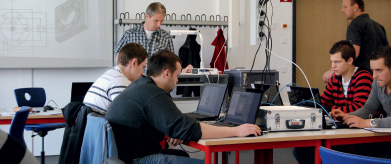
Before they are allowed on the machines, the pupils have to write the programs.
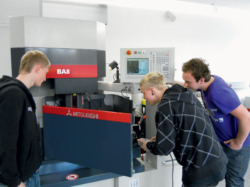
The pupils write short programs at the machine.
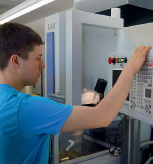
Unsupervised work is encouraged in workshop lessons.
The school turned to Mitsubishi Electric, the market leader with EDM equipment. Mitsubishi knew from its own experience how important it is to introduce vocational school pupils to advanced technology at an early stage so that they acquire sound training and a good basis for their future careers. Quickly and without red tape, Mitsubishi agreed to support the vocational school and pledged two demonstration machines. Nevertheless, the school was not alone in showing interest in these machines, and one was required at short notice in industry. But Mitsubishi responded immediately and, as an alternative, offered a new machine for the price of a demo model. The school’s managers and the teachers concerned of course had no hesitation in accepting this solution.
At the handover ceremony for the BA8 compact wire EDM machine and a die-sinking machine of the EA series for advanced, top-quality erosion, there were smiles all round in the modernised workshops.
For Manfred Euler, workshop instructor at Villingen-Schwenningen vocational school responsible for erosion and milling, what counts is progressive and innovative pupil training. Essential for this
in his view are modern machines and technologies, as can be found today in industry. “Our claim is to combine theory and practice in our lessons. And this is only possible when trainees have the chance to practise all the commonly used processes,” Euler stresses. Part and parcel of this is a responsible attitude when using modern machines. In companies, however, modern wire and die-sinking EDM machines are often much in demand in the daily work process and can only be used for training purposes to a limited extent. For “learning by doing”, which also entails costly learning time at the machine and the freedom to make mistakes, the expensive production machines are rarely available.
To give young people the chance to engage in “hands-on” instruction, Manfred Euler and his colleagues work closely with them in the workshops of Villingen-Schwenningen vocational school. The workpieces machined and finished in the workshop are often small and intricate. This calls for precise machining of the workpiece from the trainees. In the wire EDM teaching project, for instance, pupils have to machine a vice worked to within a few thousandths of a millimetre.
“Mitsubishi responded immediately and offered a new machine for the price of a demo
model.”
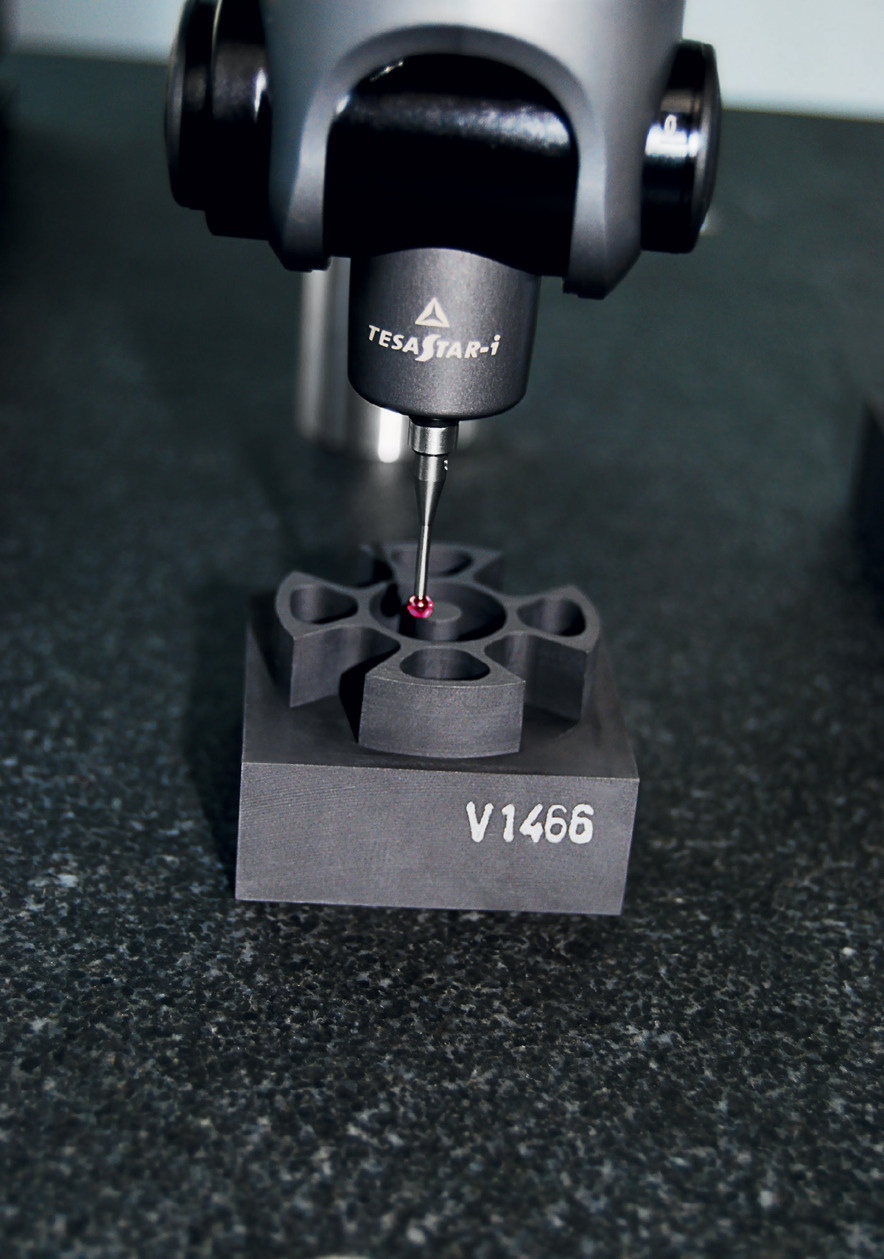
Measuring machines are the ultimate arbiter at the vocational school.
Working from drawings or data from the CAD program, the first step for trainees involves studying the drawing and writing the machine program for every single component of the vice. Everything from the 60 x 25 mm base, the jaws and the jaw inserts has to be shaped with precision. However, the process of converting a block of metal with a programmed idea into a vice takes a series of work steps. The pupils have to tool the machine by themselves and simulate a program run before machining can start. However, when the young people finally have the finished item in their hands, a vice they’ve machined and assembled themselves, they can’t help being proud of themselves.
The instructive value of such projects for pupils is inestimable. However, implementing such projects costs the school more than it can afford. This is also where sponsors like Mitsubishi Electric have an important role to play. The experts are on hand to advise teaching staff with their technical knowledge, while also supporting the school with consumables such as erosion wire.
The profession of tool mechanic and hence the course of training is challenging, and this is reflected in the qualifications for the course. “About 90 per cent of our trainees have a technical school-leaving qualification,” says Manfred Euler. The tool mechanics course takes 3 ½ years, a length of time most of the trainees also need. Only five to ten per cent make use of the chance to shorten the course.
Each year about 60 trained tool mechanics leave Villingen-Schwenningen
vocational school. They have lessons on theory, divided into classes of about 30 pupils each. However, in practical workshop instruction, this size of class is too large for a good standard of teaching. “We’ve therefore split the workshop classes into 15 pupils per class. We want them to learn a wide range of tasks either in small groups or by themselves,” Manfred Euler explains.
Today’s youngsters are the workforce of the future. This explains the need to have technical colleges and vocational schools that provide high-quality training and share the training of future skilled staff with companies. They need the commitment of industry.
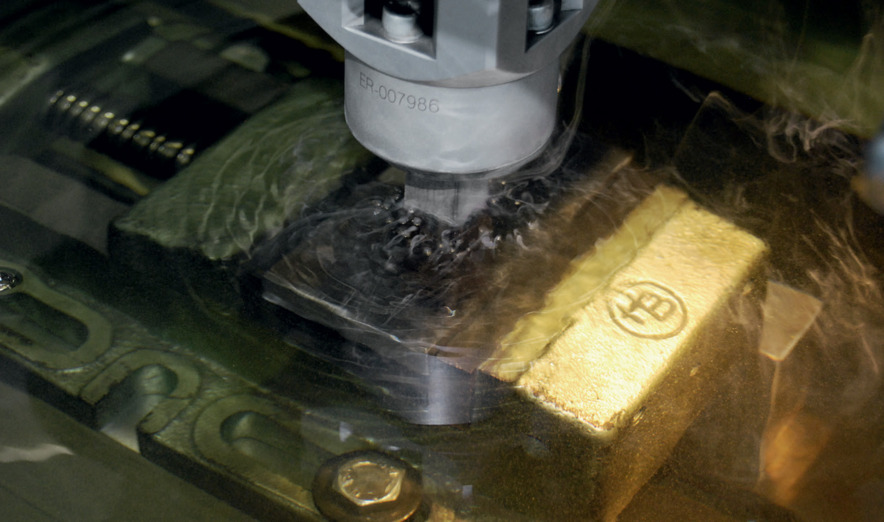
The vice machined during project work is only 60 mm long but fully functional.
Villingen-Schwenningen
Vocational school
Conrad-Heby-Strasse 1
78048 Villingen-Schwenningen
Germany
Tel +49 . 7721 . 8836 0
Fax +49 . 7721 . 8836 213
villingen @ gewerbeschule-vs.de
Fields marked with a * are mandatory.
Mitsubishi Electric Europe B.V.
German Branch
Mitsubishi-Electric-Platz 1
D - 40882 Ratingen
Sales
Tel.: +49 (0)2102 / 486 - 6120
edm.sales@meg.mee.com
Service
Tel.: +49 (0)2102 / 486 - 7600
edm.hotline@meg.mee.com
Applications
Tel.: +49 (0)2102 / 486 - 7700
edm.applikation@meg.mee.com
Spareparts
Tel.: +49 (0)2102 / 486 - 7500
edm.parts@meg.mee.com